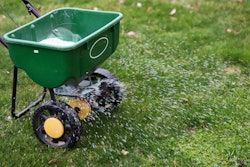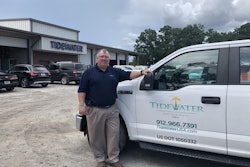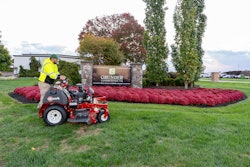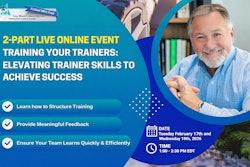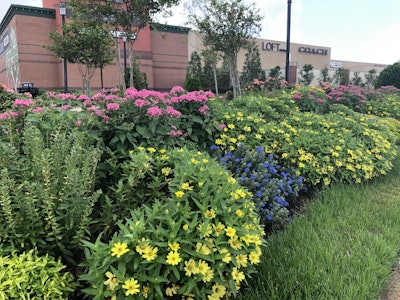 Photo: Jill Odom/Total Landscape Care
Photo: Jill Odom/Total Landscape CareTideWater Landscape Management has been a staple in Savannah, Georgia, for 35 years, and one of its main characteristics is its willingness to work with its commercial customers.

“We don’t want to do something for you just for this year,” Thompson says. “We want to do it for the next 20 years, so I think that’s the approach you have to take.”
Thompson says that it is better to work with a company, rather than work for them.
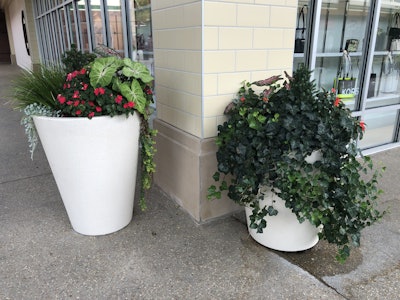 Photo: Jill Odom/Total Landscape Care
Photo: Jill Odom/Total Landscape Care“If people know and understand that you’re just not trying to make a sale, it’s easy for me to sign up a new partner, because I’ll sit down and just talk to them,” Thompson says. “I’m not trying to sell you. I’m not trying to be slick. I’m going to tell you the good and bad up front where you’re at. If we can come to an agreement and provide a service for you, that’s great. But if we can’t, maybe you gained a little bit of knowledge about your property along the way. It doesn’t always work out, but most of the time it does.”
TideWater is often willing to customize a service in order to partner with a new business and this level of care in personalization tends to go a long way.
“We try to show them the value that we’re giving them outside the contract,” Thompson says. “It’s very difficult to create relationships and partnerships if you just go by the letter of the contract, because everything is not a contract.”
Thompson says that having a good partnership starts with a relationship and communication. When TideWater brings on a new partner, the salesperson and the account manager who will handle that property will conduct a walkthrough of the property and discuss the contract, process and other matters with the business, so everyone is on the same page.
Thompson believes communication is one of the key components to being successful in the industry.
“I firmly believe that if somebody takes the time to email you or something, you need to follow up soon as you possibly can,” Thompson says.
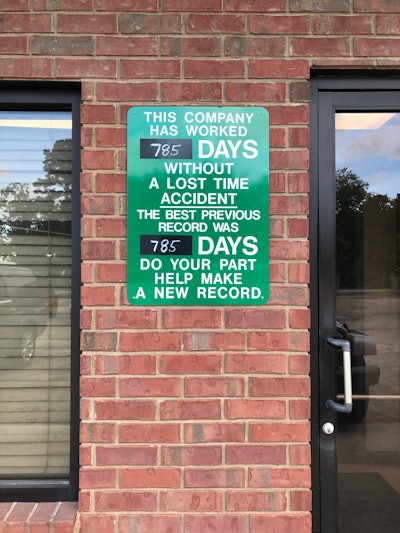 TideWater’s safety record as of July 10, 2019.
TideWater’s safety record as of July 10, 2019.Photo: Jill Odom/Total Landscape Care
He also says they make an effort to keep their partners informed about everything going on with their property, including the bad, and what TideWater’s plan is to remedy it.
“If you let them know the bad, they know that you’re taking care of your property,” Thompson says.
Thompson admits that every company is going to make mistakes, but it is what you do next to correct those mistakes and move forward afterward that matters the most.
“We do what we say no matter what,” he says. “We would rather lose a little bit and make sure we’re good with a customer and we’re good with ourselves than not do the right thing.”
Keys to success
When it comes to TideWater’s keys to success, Thompson credits it to listening, being proactive and never stopping teaching and learning.
The first key to success is pretty self-explanatory, as you cannot best serve your client if you are not listening to what they want from you.
“You can gain more business by listening to what their wants, concerns and needs are,” Thompson says. “If you don’t listen first, you’re lost.”
Being proactive has several different aspects to it, including, as Thompson mentioned earlier, informing partners of any issues they find on their property.
“Sometimes, I’ll call our customer or email our customer and say, ‘Hey, I’ve looked at your property, and it looks like we got an issue in this area,’” Thompson says. “‘I just want you to know, I saw it. Here’s our plan. We’re going to make sure it gets taken care of.’ I’ll let them know bad just as much as I do the good.”
It also relates to how TideWater works to be proactive and prevent downtime by taking preventative maintenance seriously. Crews handle the basic maintenance by checking the blades and such and then on a weekly basis, the company mechanic services all the equipment.
TideWater minimizes its downtime even further by participating in John Deere’s Parts OnSite program, which ensures any of the common parts a piece of equipment will need is stocked once a month.
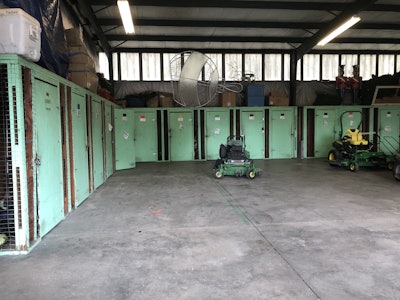 Crews stay organized by storing their tools in color-coded and numbered lockers.
Crews stay organized by storing their tools in color-coded and numbered lockers.Photo: Jill Odom/Total Landscape Care
Another element of being proactive is how crews will fuel up at the end of the day. Employees will place their mowers on a truck and the equipment they will need for the next day in their respective color-coded lockers, so they are ready to go first thing in the morning.
The final keys to success are teaching and learning, according to Thompson.
“You can’t ever stop teaching, can’t ever stop learning,” he says. “Our industry has changed so much and continues to change so much. If you’re not learning something every day, you’re going to be behind so quickly. It’s amazing with technology and everything now.”
While he isn’t mentoring any younger landscapers in particular, Thompson is never opposed to helping out others in the business if they call asking for some guidance.
“You’ve got to share information,” he says. “You’ve got to share experiences. Anybody that’s been in business for this long has done things wrong way at some point. So, it’s okay to share those so maybe they don’t have to go through that stuff. I enjoy Landscapes every year, so you get to talk to a lot of people about stuff like that.”
Thompson attends Landscapes every year, which is held in conjunction with GIE+EXPO, to also keep up with the latest trends and equipment.
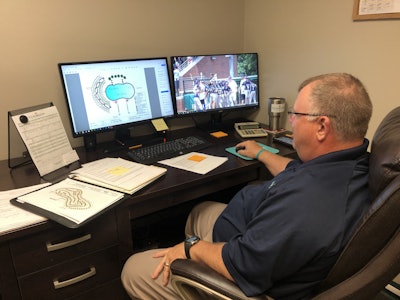 Skip Thompson, CEO of TideWater, uses PRO Landscape software for his design work.
Skip Thompson, CEO of TideWater, uses PRO Landscape software for his design work.Photo: Jill Odom/Total Landscape Care
“I’m trying to absorb everything I possibly can as far as technology,” Thompson says.
TideWater often works to teach its partners as well. One example of this is if the company starts managing a property where crape murder was committed, TideWater’s certified arborist will assess the situation and explain to the partner why it is not a sound horticultural practice.
“You want someone that’s going to be open and receptive,” Thompson says. “Because at the end of the day, you try to remind them that you’re hiring us. We are actually professionals. We’re certified. We have the education. This is what we absolutely do.”
As for Thompson’s advice, if he was starting all over again, he says you shouldn’t be afraid to fail.
“Because you’re going to,” he says. “You’re probably going to do that a lot initially and it’s okay as long as you learn from it. It’s not that you made a mistake. The most important thing you ever do, whether it’s baseball, life, anything, is what you do next. If you apply that, it will take you a long way. It’s how you react, how you recover and how you move forward from those mistakes and failures.”


